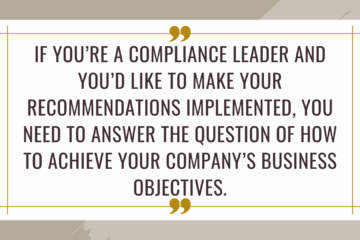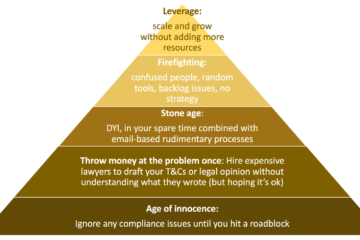About Compliance Immunity
If you work in compliance, you have told your business partners (multiple times) that they must “own their risks” and make the final decisions – and that the role of compliance is to remain independent and to offer expert advice. You probably think that this is just the way things are.
And this is the biggest myth in the financial industry, hurting you and your career and professional reputation. I call it compliance immunity.
I get it – this is what you see days in and days out: the business is taking risks and calling the shots, and compliance is “offering feedback”. You maybe thinking – since I won’t get any rewards or bonuses if business grows faster or when things go well, you are not paid for taking these risks. You also know all too well, you’ll get in trouble and get all the blame, when the risk is too high and the audits does not go well.
So, why do I think it’s wrong? – Because if you don’t ever take the risk and remain an independent consultant, you are not really invested in the success of your business, you don’t have any skin in the game, and you are not an equal partner with all the other executives. Which is exactly why you are not seen as someone who can provide a valuable input, who should be invited to join strategic conversations or paid a higher salary. You just can’t have it both ways: you either remain independent expert or you truly care about where your business is going. You will never be equally respected and your opinion will never be as valued and your bonus will never be as high, if you keep playing safe.
Compliance immunity feels “safer” in the moment, because you think that you are minimizing negative consequences, but long-term, it backfires: if compliance people don’t have any skin in the game for the overall company success and if they openly shift responsibility for the ultimate decision to the business, they are not seen as equal, they are not offered promotions and bonuses at the same level, they are not consulted in advance, and long term, they are just more and more pushed to the corner. If you have nothing to lose, you opinion does not count as much.
I think it’s wrong and unfair to our profession, but it’s also sad, because compliance people themselves often contribute to the problem.
Actually – you may have an illusion that compliance immunity and independence somehow protects you by limiting your responsibility, but I hope you see now, how it also limits your career and the value you can add.
Let me ask you – when you use your compliance immunity and tell your business partners that it’s up to them to take the final decision and be responsible for all the risks – does it really serve you or your company? Do you feel more respected, to you see your promotions are coming faster, are you invited to join strategic conversations more often? Does it make you more productive or influential or respected inside of your company?
No! Shifting responsibilities and enjoying your compliance immunity is just increasing the gap between compliance and business even further, causing more isolation, more hurt feelings and more bad decisions. There is no way that you can enjoy your immunity, have no skin in the game and be a respected leader and an equal partner in any organization.
On average, compliance officers are paid less than legal officers and definitely less than their peers in sales or business development. Chief compliance officers rarely stay in their job longer than 1-2 years and their number one reason for changing jobs is that they don’t get “business buy-in” or don’t feel fully appreciated for their contribution.
Every time I interview compliance experts and ask them why they’d like to change jobs, the answer is – people want to be more strategic and contribute to the business in a more meaningful and bigger way.
That’s the missing link – you cannot have it both ways. You cannot be a respected, fully involved and equal member of the executive or a management team and not equally share the risks and accountability for the ultimate outcome. To succeed in the compliance profession, a mix of shared incentives and risks as wells as rewards, is a must.
I’m not suggesting that compliance people must be directly responsible for sales or revenue growth and nothing else. All I’m saying is that the incentives, risks and reward must be balanced.
And if you are someone who wants to add value and be heard and respected within your business or your company, you already know something has to change, because the current situation is not producing the results that you’d like.
If you don’t change, you will be changing companies and bosses and business lines, you will not be adding much value to your organization, and as a result you may grow frustrated and alienated and potentially can even get fired for poor performance.
So – Do you really want to keep thinking that business risk is not really your problem, and keep playing your immunity card? Or do you want to change the status-quo and change the perception of what compliance could actually do?
If so, feel free to share this video.


